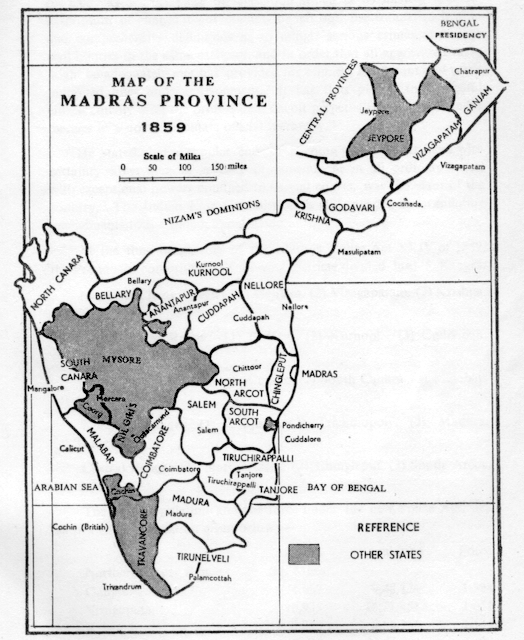Andhra State was a state in India created on October
1, 1953 from the Telugu-speaking northern districts of
Madras Presidency. On November 1, 1956 it was merged
with the Telangana region of Hyderabad State to form
the united Telugu-speaking state of Andhra Pradesh.
Contents
1 Madras Manade movement
2 Creation of Andhra State
3 Telugu Speaking Districts of Madras Presidency
4 Merger with Telangana
5 See also
Madras Manade movement
In 1953, Telugu speakers of Madras Presidency wanted
Madras as the capital of Andhra state including the
famous slogan Madras Manade (Madras is ours) before
Tirupati was included in AP. Madras, at that time was
an indivisible mixture of Tamil and Telugu cultures. It
was difficult to determine who should possess it.
Panagal Raja, Chief Minister of the Madras Presidency
in the early 1920s said that the Cooum River should be
kept as a boundary, giving the northern portion to the
Andhras and the southern portion to the Tamils. In
1928, Sir C. Sankaran Nair sent a report to the Central
Council discussing why Madras does not belong to the
Tamils. Although historically and geographically it is
a part of the Andhra region, the greater political
dominance of the Tamils in 1953 at both Central and
State level politics caused Madras to remain in the
Tamil region. According to the JPC report (Jawahar Lal
Nehru, Bhogaraju Pattabhi Sitaramayya, C.
Rajagopalachari) Telugu people should leave Madras for
Tamils if they want a new state.
Creation of Andhra State
In an effort to protect the interests of the Telugu
people of Madras state, Amarajeevi Potti Sriramulu
attempted to force the Madras state government to
listen to public demands for the separation of Telugu
speaking districts(Rayalaseema and Coastal Andhra) from
Madras state to form the Andhra state. He went on a
lengthy fast, and only stopped when Prime Minister
Jawaharlal Nehru promised to form Andhra state.
However, there was no movement on the issue for a long
time. He started fasting again for attaining statehood
for Andhra in Maharshi Bulusu Sambamurti's house in
Madras on 19 October 1952. It started off without
fanfare but steadily caught people's attention despite
the disavowal of the fast by the Andhra Congress
committee.
The government of the day however did not make a
clear statement about the formation of a new state
despite several strikes and demonstrations by Telugu
people. On the midnight of 15 December (i.e. early 16
December 1952), Potti Sreeramulu died and laid down his
life trying to achieve his objective.
In his death procession, people shouted slogans
praising his sacrifice. When the procession reached
Mount Road, thousands of people joined and raised
slogans hailing Sriramulu. Later, they went into a
frenzy and resorted to destruction of public property.
The news spread like wildfire and created an uproar
among the people in far off places like Vizianagaram,
Visakhapatnam, Vijayawada, Rajahmundry, Eluru, Guntur,
Tenali, Ongole and Nellore. Seven people were killed in
police firing in Anakapalle and Vijayawada. The popular
agitation continued for three to four days disrupting
normal life in Madras and Andhra regions. On 19
December 1952, the Prime Minister of the country
Jawaharlal Nehru made an announcement about formation
of a separate state for Telugu speaking people of
Madras state.
House no. 126, Royapettah high road, Mylapore,
Madras is the address of the house where Potti
Sriramulu died and it has been preserved as a monument
of importance by the state government of Andhra
Pradesh.
On the basis of an agitation, on November 1, 1953,
11 districts in the Telugu-speaking portion of Madras
State voted to become the new state of Andhra State
with Kurnool as the capital. Andhra Kesari Tanguturi
Prakasam Pantulu became first Chief Minister of thus
formed Telugu State. Thus, Andhra State was a state
created in India on October 1, 1953 from the
Telugu-speaking northern districts of Madras
Presidency. It comprised Coastal Andhra and Rayalaseema
Regions.
The formation of linguistic states is the single
most important event in the history of South Indian
languages, as it provided an opportunity for these
languages to develop independently, each of them having
a state to support."
Telugu Speaking Districts of (old) Madras
Presidency

Madras Province in 1859. Created by the British,
Madras was mainly composed of Telugus (North) and
Tamils (South)
Coastal Andhra Region
Srikakulam District
Vizianagaram District
Visakhapatnam District
East Godavari District
West Godavari District
Krishna District
Nellore District
Prakasam District
Guntur District
Rayalaseema Region
Kurnool District
Kadapa District
Anantapur District
Chittoor District
Merger with Telangana
On November 1 1956 Andhra State was merged with the
Telangana region of Hyderabad State to form a united
Telugu-speaking state of Andhra Pradesh.